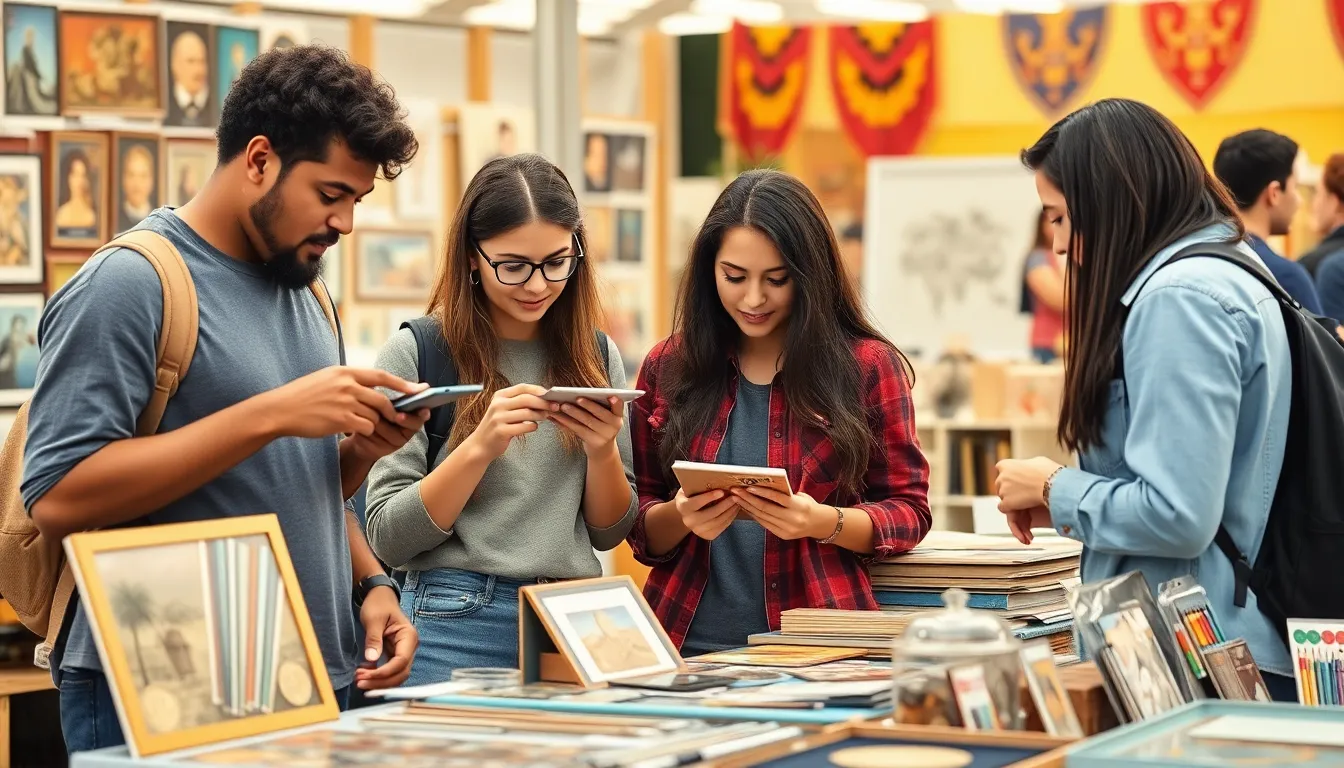As graduation day approaches, the reality of college expenses looms large. Between tuition, textbooks, and the occasional pizza binge, the financial burden can feel overwhelming. But what if there’s a fun way to ease that stress? Enter the world of collecting for college—a quirky yet effective strategy that turns hobbies into cash flow.
Imagine transforming your love for vintage vinyl records or rare comic books into a college fund. Not only does it give you a chance to declutter, but it also adds a little excitement to the otherwise mundane task of saving. With the right approach, collecting can be both a treasure hunt and a money-making adventure. So grab your magnifying glass and let’s dive into the art of collecting for college—because who said funding your education couldn’t be a blast?
Table of Contents
ToggleUnderstanding Collecting for College
Collecting for college offers a unique opportunity for students to fund their education. This approach allows students to transform their passions into financial assets.
What Is Collecting for College?
Collecting for college involves gathering items of value that can be sold to support educational expenses. Students frequently focus on hobbies, including collecting vintage vinyl records, rare comic books, or limited-edition sneakers. Turning these collections into cash helps offset costs associated with tuition, textbooks, and supplies. Potential buyers often appreciate the effort and passion behind these collections, enhancing their value.
Importance of Collecting for Future Students
Collecting plays a vital role in preparing for college expenses. It cultivates financial literacy, as students learn how to assess the market value of their items effectively. Engaging with collectors and enthusiasts builds a network that can benefit students academically and personally. This experience encourages creativity in generating funds and adds excitement to the journey of funding education. Collecting also fosters discipline, as careful selection and upkeep of items require commitment and organization.
Types of Collectibles

Collecting offers various avenues for students to explore financial opportunities while pursuing college expenses. Different types of collectibles can yield substantial returns if assessed and marketed effectively.
Art and Antiques
Art and antiques provide unique investment potential. Paintings, sculptures, and vintage furniture can appreciate significantly in value over time. Finding items at estate sales, auctions, or flea markets can lead to profitable discoveries. Collecting local artists’ works may boost community engagement and present networking opportunities. Provenance and rarity often drive prices; thus, researching an item’s background enhances valuation. Students can join local art appreciation groups to broaden their knowledge and enjoy the experience.
Rare Coins and Currency
Rare coins and currency appeal to both history enthusiasts and investors. Collectors often seek coins based on mint year, rarity, and demand among numismatists. Some coins, like gold or silver bullion, boast intrinsic value beyond collectible status. Tracking trends in the numismatic market keeps one informed about valued items. Students can find coin-collecting clubs in their area, facilitating knowledge sharing and potential trading opportunities. Auctions and online marketplaces frequently showcase sought-after pieces that may yield higher profits.
Sports Memorabilia
Sports memorabilia holds significant appeal for fans and collectors alike. Items such as jerseys, autographed balls, and trading cards often appreciate in value, especially if linked to iconic athletes or historic events. Collectors frequently target limited editions and rare finds that resonate with sports culture. Engaging with fellow collectors at trade shows can provide insights into market dynamics. Online platforms also offer chances to trade, sell, or auction items efficiently, maximizing the return on investment.
How to Start Collecting
Starting a collection for college can be exciting and rewarding. Focusing on both budgeting and thorough research sets the foundation for success.
Setting a Budget
Establishing a budget is crucial when collecting for college. Knowing an overall financial limit prevents overspending and enables smarter purchasing decisions. Allocate specific amounts for each collectible category, such as vintage vinyl records or comic books. Prioritizing essentials helps maintain control, ensuring that spending aligns with educational goals. Regularly assess the budget, making adjustments based on market trends and personal financial situations. This practice cultivates responsible collecting habits and fosters better financial management skills.
Researching Collectibles
Conducting thorough research enhances the collectible experience. Begin by evaluating market trends and identifying popular items in your chosen categories. Online platforms, social media, and collector forums serve as valuable tools for gathering insights. Study the provenance and history of individual items to determine potential value appreciation. Participating in local collector clubs offers opportunities to connect with experienced collectors and gain practical knowledge. Staying informed about industry news helps navigate fluctuations in value, while networking opens up avenues for trade and sales, maximizing the chances of successful collecting.
Tips for Successful Collecting
Successful collecting combines passion with strategy. Engaging with the right community and maintaining items properly can lead to financial gains.
Networking with Other Collectors
Building connections with fellow collectors enhances the experience. Joining local clubs opens doors to exchanges, collaborations, and valuable insights. Online forums expand reach, allowing interaction with a global audience. Sharing knowledge about trends and provenance enriches understanding. Relationships in these networks often lead to trading opportunities and exclusive sales. Participating in events like conventions or trade shows provides exposure to rare items and expert opinions. Cultivating a network not only supports personal growth but can yield financial benefits when selling or appraising collectibles.
Maintaining Your Collection
Proper maintenance ensures the longevity and value of collectibles. Each item requires specific care based on its material and condition. Regular cleaning preserves appearance and prevents deterioration. Documenting provenance assists in establishing value over time. Creating a catalog helps track items, providing clarity on what’s in the collection. Proper storage solutions protect against physical damage and environmental factors. Evaluating market trends allows for strategic selling, ensuring the right time for sales. Consistent maintenance contributes to a successful collecting venture, maximizing potential returns.
Collecting for college offers a unique way for students to tackle financial challenges while pursuing their passions. By transforming hobbies into income sources, they not only alleviate financial stress but also gain valuable skills in budgeting and market assessment. The journey of collecting fosters creativity and discipline, equipping students with the tools needed for responsible financial management.
As they engage with fellow collectors, students build a supportive network that can enhance their collecting experience. Through research and strategic planning, they can maximize the potential of their collections. Ultimately, collecting becomes more than just a means to fund education; it’s a fulfilling endeavor that enriches their college experience and prepares them for future financial responsibilities.





